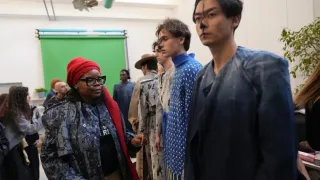October 29, 2017
Synchronized Hearts
Matthew Kennedy READ TIME: 2 MIN.
Todd Haynes' high-reaching ode to youthful dreams and disappointments "Wonderstruck" comes to us from New Jersey-born designer-illustrator-author Brian Selznick's popular 2011 book.
Selznick is a historical novelist, but hardly in the classic James Michener-Herman Wouk mold. He combines words and images into fanciful, twisty, object-laden, adult-and-kid-friendly storytelling. His best-known book, "The Invention of Hugo Cabret," became the Martin Scorsese film "Hugo," about an orphan rescuing the automata of pioneering filmmaker Georges Melies from a museum garbage pile.
There are no easy antecedents for "Wonderstruck," for no book or film has heretofore been concerned with two deaf children separated by 50 years (1927 & 1977), alone in New York City, searching for clues to family mysteries. Both survive on ingenuity and determination, and both find a strange comfort at the American Museum of Natural History as their stories intersect with grown-ups and ancestors played by, among others, Julianne Moore and Michelle Williams.
"Wonderstruck" is devoted to children's capacity for awe and discovery in the material world. Haynes' camera languishes on the taxidermy of the museum's dioramas, and delights in what's hidden in the musty old drawers of forgotten storage rooms. I like Todd Haynes because, unlike so many filmmakers, he is humble enough to recognize and consciously tribute his predecessors without being imitative. He takes what's fine about far outre film styles and overlays them with what's permitted in the 21st century.
The 1927 "Wonderstruck" sequences are suffused with a pulsing, silvery glow evoking the best surviving films of the late silent era. His film-within-a-film snippet "Daughters of the Storm" is a title in proximity to D.W. Griffith's 1922 "Orphans of the Storm." Moore as actress Lillian (Gish) Mayhew battling relentless big weather while clutching her swaddled baby does pure honor to Victor Seastrom's 1928 "The Wind."
Certain moments of "Wonderstruck" are rapturous in their visual beauty. When young Rose (remarkable deaf actress Millicent Simmonds) falls on a busy Manhattan street and looks up to find a kindly stranger offering to assist her, or rides a trolley while the blazing neon lights of Times Square burn in the background, the shots are as translucently beautiful as anything in late silent masterpiece "The Crowd."






